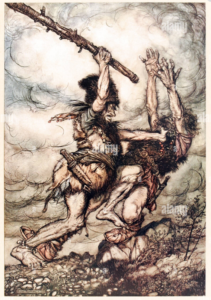The Barter
When the gods of Valhalla saw the immense treasure brought there by the Nibelungs, they understood the reason for Votan and Loge’s journey to the realm where Alberich ruled. With these riches, it was possible to seduce Fafner and Fasolt. They would agree to give Freia in exchange for jewels and precious stones so that the goddess could continue to cultivate the fruits that conferred eternal youth on the inhabitants of Valhalla.
Votan ordered Loge to call the giants to arrange the barter. When the giants saw the huge treasure deposited on the spacious esplanade of Valhalla, they opened their eyes wide.
“Come closer,” commanded Votan.
The giants approached the treasure and the lord of Valhalla continued:
“Do you see these jewels, these precious stones, these chests full of gold? I offer you all this in Freia’s stead.”
Fasolt was about to nod when he was stopped by a gesture from Fafner. He replied:
“Great and valuable is this treasure of the Nibelungenland; but Freia is worth more than all the riches of the world. She, and she alone, can confer eternal youth on the gods. Since the day she left Valhalla you have all grown somewhat older. As the days go by, your faces will be covered with wrinkles…”
“Enough!” cried Votan angrily.
The giants backed away in fear, and the god continued:
“Do you want more than this treasure to leave Freia to us?”
“I understand that in addition to the precious stones, the metal bars and the carved jewels, there was a helmet forged by Mime.”
“Take the helmet too,” interrupted Votan, tossing it onto the pile of jewels.
The giants remained mute. They neither denied nor nodded.
“Do you want anything else? Answer me!”
“On your hand shines the ring that Alberich forged from the gold of the Rhine,” continued Fafner.
“The ring was not part of Alberich’s treasure. The gold with which he forged it had been stolen.”
“Stolen or not, it was his until you and Loge took it from him.”
Votan hesitated for a moment. He looked at the faces of the gods who witnessed the scene and noticed in them obvious signs of ageing. In the eyes of all his sons, the lord of Valhalla read the desire not to prolong Freia’s absence any longer.
Throwing the ring on the pile of jewels, Votan exclaimed:
“Take the ring, and along with it, the curse of Alberich!”
Fasolt was the first to throw himself on the treasure and seized the ring.
Fafner demanded the jewel.
“Why should I give you the ring,” asked Fasolt.
“Because I got it. If it hadn’t been for me, you would have accepted Votan’s first offer, without the helmet and the ring.”
“That is not sufficient reason to claim the preference. The jewel is on my finger, and no speech of yours will suffice…”
Fasolt was unable to continue, for a tremendous blow from Fafner cracked his skull.
Fafner kills Fasolt by
Arthur Rackham (1867-1939)
The murderer, after returning Freia, took the treasure, the magic helmet and the fatal ring.
Fasolt’s corpse lay there, at the mercy of the vultures’ voracity.
The Nibelung’s curse bore its first fruit.

One reply on “The Ring of the Nibelung, 4”
LOTR was published in the decade following WW2.
The anti-German spirit that gripped the West was such that neither Tolkien nor ordinary white people dared to state the obvious: that the story of the accursed ring was an original by the artist Hitler loved most.
The lies of our day include even what we have been telling ourselves about artists. Another example: In Journey to the Center of the Earth, a 1959 film, instead of respecting Jules Verne’s novel, the screenwriters transferred the plot from Hamburg, Germany, to Edinburgh in Scotland; and for exactly the same reasons.